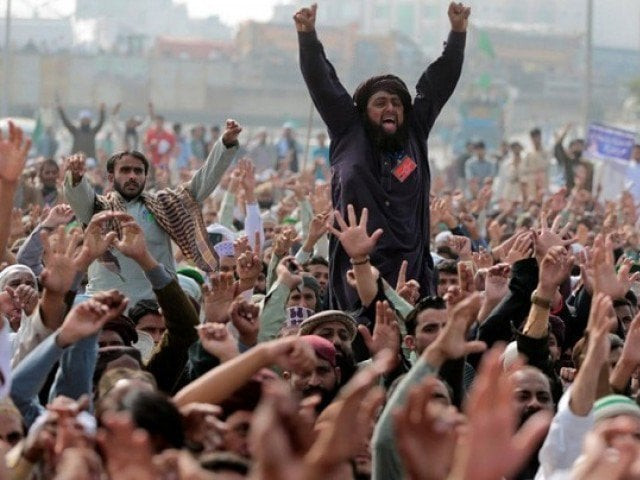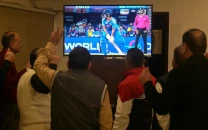Govt told to submit rules governing secret agency
Supreme Court asks ECP if a political party that causes damage to people, properties can still be registered

PHOTO: EXPRESS
“We accordingly direct the Ministry of Defence secretary, which is stated to be the ministry under which the ISI comes and learned Attorney General for Pakistan (AGP) to submit the law/rules/ instructions governing the ISI and its mandate," said a five-page order on Tuesday.
The order issued by a two-judge Supreme Court bench comprising by Justice Mushir Alam and Justice Qazi Faez Isa said the court with the assistance of Deputy Attorney General Sohail Mahmood examined the ISI report on the sit-in organised by the Tehreek-e-Labbaik Pakistan (TLP).
In the report, the bench noted, the agency could neither ascertain whether the TLP leader [Khadim Hussin Rizvi] has a bank account or whether he is a taxpayer or not. The ISI said such information could only be obtained from the State Bank of Pakistan and Federal Board of Revenue (FBR) respectively.
It said when the bench asked the Director Legal Brigadier Falak Naz about the law/ regulations/ instructions which determine the ISI mandate, he said the ISI is governed by the “law of the country” but he did not mention any law.
The order also asked the Election Commission of Pakistan (ECP) and the AGP to explain whether a party that brought the country to a ‘standstill, caused massive economic loss and loss of lives, injured law enforcement agencies personnel and caused destruction to public and private party could be registered as a political party or be allowed to continue as such.
It also noted that the ECP in its reply revealed that the documents presented for registration by the TLP were signed by a person who held a National Identity Card for Overseas Pakistanis (Nicop) which showed his residence to be in the United Arab Emirates (UAE).
“However the ECP Director General (law) Muhammad Arshad cannot give answer whether the said person possesses a Pakistani passport or [is] a dual national or a foreign national and instead stated that the party can be registered by those having Nicops but without referring to any provision of law.”
The court wondered over the statement of the ECP DG (law) that the legal provisions are 'cosmetic in nature’. “We are amazed that a senior employee of the ECP that it is the DG law ECP is himself undermining the Elections Act and Elections Rules,” the order read.
The bench asked the ECP to enforce Articles 218 and 219 of the Constitution. In view of the said constitutional and legal provisions, the statement of the DG causes grave concern.
“Needless to state, credibility of the ECP is tarnished and undermined when its own senior officer states that its law is cosmetic. The ECP is empowered to take action pursuant to the Elections Act. It appears that the ECP does not intend to do anything despite the law being violated.”
The court directed the ECP to submit in writing whether it subscribes to the view of the DG Muhammad Arshad and if not then what action it proposes to take against the political party. The court also directed the ECP secretary to attend the next hearing scheduled for tomorrow (Thursday).
The bench also expected the AGP to come prepared to attend to the matters noted in the order.
The order also said the court will determine the parameters of protests and how these have to be handled by the state. “In this regard, whether there are parallels with other protests and how those were handled including those of 12th May, 2007 in Karachi and the Pakistan Tehreek-e- Insaf (PTI) and Pakistan Awami Tehreek (PAT) dharna at D-chowk Islamabad,” said the order.
Blocking TV broadcast
The order also noted that broadcast of any channel cannot be curtailed by any cable operator. Every channel employs people and generates revenue including for the government of Pakistan; therefore, interrupting or blocking its broadcast adversely affects the economy too.
The order said freedom of speech and expression and the freedom of press have been prescribed as fundamental rights in the Article 19 of the Constitution.
It said the Pakistan Electronic Media Regulatory Authority’s (Pemra) inability to trace the culprits is undermining these fundamental rights and the laws governing Pemra. It termed Pemra’s reply as ‘non serious’ and directed the authority to file a fresh report tomorrow (Thursday).
It is learnt that the AGP Anwar Mansoor Khan later held a meeting with Chief Election Commissioner Sardar Raza on Tuesday to devise strategy regarding the issues highlighted by the bench.


















COMMENTS
Comments are moderated and generally will be posted if they are on-topic and not abusive.
For more information, please see our Comments FAQ